Pulitzer Center Update April 8, 2025
Teacher Fellows Engage Over 1,500 Students in Projects Inspired by Global Health Reporting
Country:
A total of 1,582 high school students from nine states engaged with over a dozen Center-supported health stories as part of learning experiences created by the 14 educators in the 2024 Pulitzer Center Teacher Fellowship, “Making Connections to Global Health Stories.” Students applied analysis of reporting on food deserts, the impacts of manufacturing pollution on youth, plastic pollution, disparities in maternal health in the U.S., and more to the design of presentations, debates, essays, infographics, and research projects that demonstrated empowered action. This program and the resulting collection of student work is a testament to what is possible when we connect students to quality health reporting.
“Through teaching this lesson, I have come to understand how undervalued access to excellent healthcare is. By engaging in the video and article from the Pulitzer Center, I became more aware of health barriers for people in rural America even though I thought I knew what many of them were. Teaching this lesson challenged my perceptions of the American healthcare system and made me think deeply about how health equity for anyone in the world has enormous impacts far beyond a person’s physical health.”- Brielle Carlson, Grand Rapids, MN educator and fall 2024 Teacher Fellow
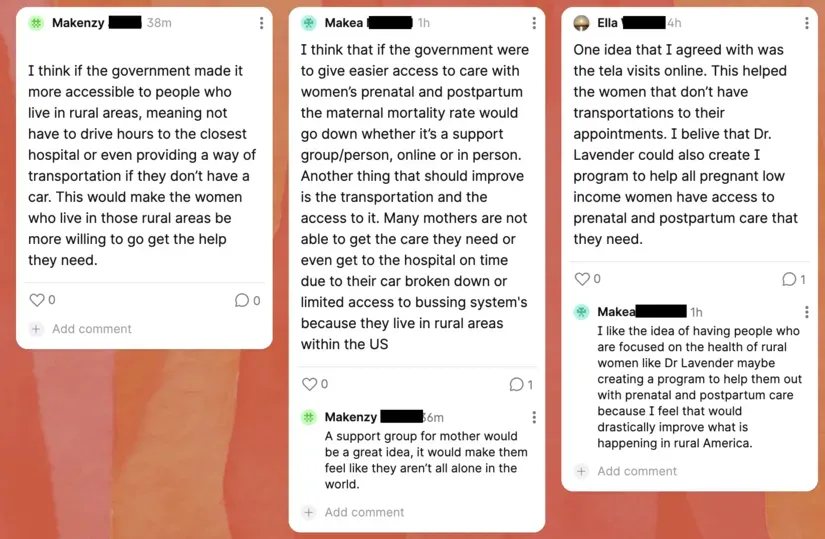
Making Connections to Global Health Stories: Centering Teachers as Learners
“My small community is experiencing challenges that so many others face as well. It's humbling to realize that our struggles are shared, and inspiring to see people stepping up to raise awareness and drive meaningful change.” - Veronica Pitts, Selma, AL educator and fall 2024 Teacher Fellow
Launched in October 2024, the three-part Making Connections to Global Health Stories fellowship for teachers was a rigorous investigation of the global health ecosystem through analysis of underreported news stories. In the first six weeks of the Fellowship, teachers were centered as learners. They unpacked personal and local connections to health topics, informing their relationship to health issues by reading Pulitzer Center news stories and connecting with three Center-supported journalists:
-
Hadas Thier, a New York-based author and freelance journalist whose work focuses on economic inequality, U.S. politics, and climate, discussed “Jackson’s Water System is Broken by Design.
-
Alejandra Martinez, an environmental reporter for The Texas Tribune discussed “Neglected and Exposed: Toxic Air Lingers in a Texas Latino Community, Revealing Failures in State’s Air Monitoring System”
-
Caleb Hellerman, a writer, reporter, and filmmaker covering science and medicine for PBS NewsHour, ABC News, and the CNN Medical News Unit, discussed “Rural RX”
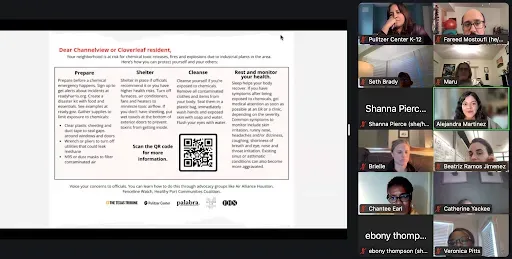
As a result of these workshops, 100% of participants felt that the fellowship program increased their knowledge about global health topics. 92% of participants reported that the workshops increased their trust in science journalism and felt compelled to discuss the global health topics covered with others.
This deep engagement with health stories inspired teachers to develop standards-aligned lesson plans that would replicate their journeys of connecting local health concerns to global issues for students, and also inspire students to advocate for solutions.
“I learned that there is a lot I don't know about global health. I so often get wrapped up. in my own "stuff" and issues that I don't look into what is happening outside of my own space and this fellowship gave me the space to do it. I am grateful to have been able to see that there are so many people doing the work of developing solutions to global health issues and hope to inspire students to do the same. “ - Shanna Pierce, Chicago, IL educator and fall 2024 Teacher Fellow
Closing the Gap for Students: From Reporting Analysis to Researching Solutions
When asked how participants plan to apply the content from the workshop, 100% of educators expressed a desire to use at least one strategy, lesson resource, or article in their classrooms.
“The impact of this program on my students was evident in their increased awareness and engagement with the issue of food insecurity, both locally and globally. They began to see the connection between their own experiences with school lunch and the challenges and opportunities faced by our global community.” - Patrick Sprinkle, a New York, NY educator and fall 2024 Teacher Fellow
In November 2024, Teacher Fellows launched their lessons and engaged students in reporting on global health topics like healthcare access in rural Nigeria, systemic issues driving maternal mortality in the United States, and the nuanced barriers to cervical cancer treatment in India. Students read and analyzed Pulitzer Center reporting, practiced media literacy skills, and increased their understanding of global health issues, which ultimately led to a culminating project that demonstrated empowered action.
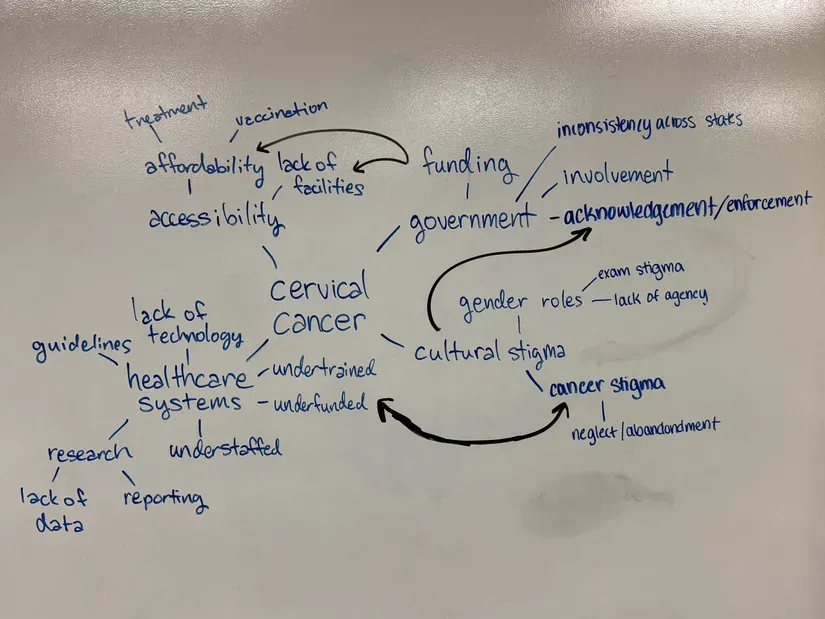
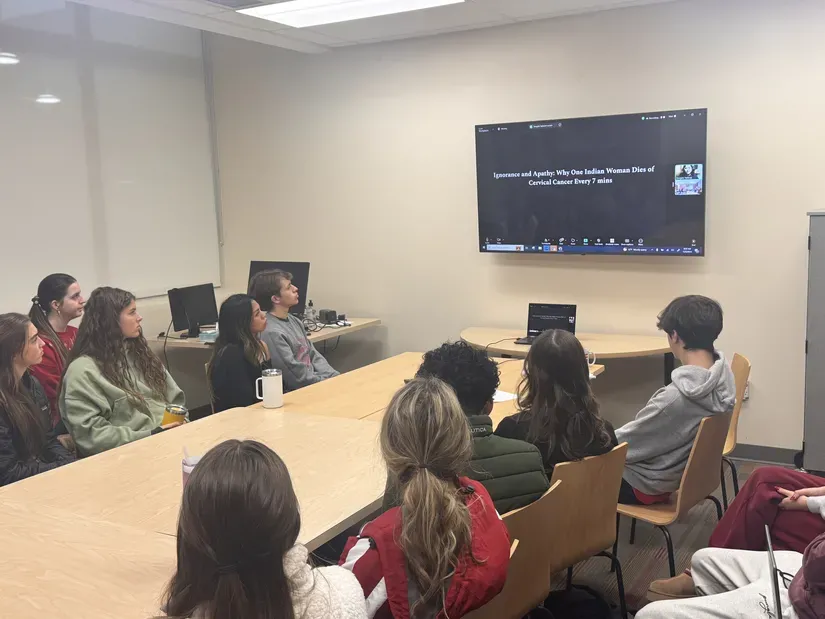
As part of their final projects, students…
- Discussed how communities, governments, and international organizations should take action to prioritize healthcare access in rural areas (Minnesota)
- Created Public Service Announcements on maternal mortality (Wisconsin)
- Led an investigation and wrote a detailed report in their school newspaper discussing the issue of lead in the air and the water in the school environment (New York)
-
Explored the health impacts of plastic pollution, discussed gaps in research, assessed the limitations of alternatives, brainstormed community solutions to reduce plastic pollution locally, and presented their findings as part of a school-wide exhibit. (Hawaii)
-
Examined the relationships between diet, GMOs, and health through the article “This ‘Super Banana’ Was Designed To Save Lives. Will It Matter That It’s Orange?” by grantee Agosto Petroni. They then connected the details in the article about food access in Uganda to the possible lack of nutrients in their personal diets, and delved into research to decide “Can a healthy diet contain GMOs?” In the end, they created an infographic to defend their answer to that claim.
Through implementation with their students, Teacher Fellows discovered that introducing quality global health reporting inspired rich classroom discussions, increased curiosity in their community, and empowered students to leverage their strengths in noticing and advocating for solutions to health issues. In a post-survey for students who engaged with lessons developed in the program, 79% of students strongly agreed that they increased their understanding of global health issues. 73% learned about one or more ways to take action on a global health issue.
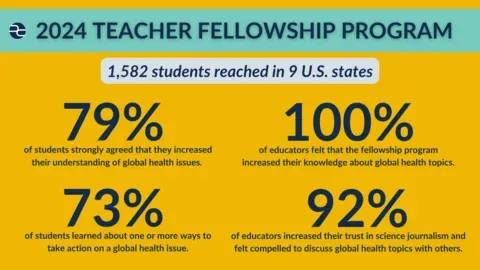
The Resonating Impact of Global Health Issues
Many teachers noticed that students continued to demonstrate curiosity and investment in global health news stories well after their lessons.
Ann Arbor, Michigan teacher Amy Frontier reported in a post-fellowship reflection that her lesson exploring the connection between international conflicts and antimicrobial resistance inspired student investment in global health issues. Frontier shared that students continued exploring global health advocates and issues in later research projects. They made connections and welcomed opportunities to replicate their experiences of learning and advocacy in raising awareness about other important issues. Frontier also shared that, “...In a serendipitous moment…students read about and created advocacy projects about AMR during the World Health Organization’s World AMR Awareness Week. Needless to say, more than 150 World Literature students were surprised and delighted to learn that their work was unexpectedly part of a larger campaign fighting against a global health threat that they had never heard of before. Next November, I hope to introduce 150 new World Literature students to the ways that they can raise awareness about AMR and other global health threats. “
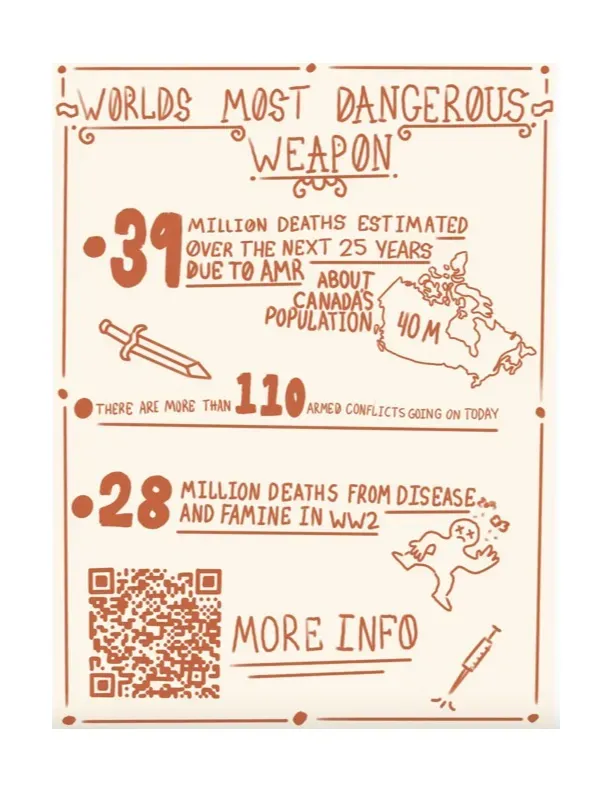
All fourteen lesson plans, teacher reflections and examples of students’ work will be published throughout the summer and highlighted in our weekly K-12 Education newsletter. Subscribe to the Pulitzer Center’s education newsletter for more on this program and future opportunities.



.jpeg.webp?itok=IH_bOybe)
